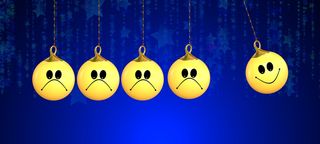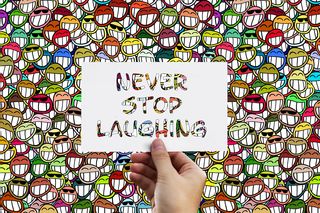Humor
Why Do People Laugh During a Crisis? The Role of Humor
Part Two: Examining the role of laughter during difficult times.
Posted March 23, 2020

Part one of this series examined ideas related to why people use humor in crisis situations inspired by The Thoughtful Counselor podcast, Episode 161: The Philosophy of Humor, Theories of Ridiculousness with Steven Gimbel and Alfredo Palacious (a collaboration with Theory of Change podcast), and focused on understanding why people laugh during a crisis, the COVID-19 pandemic of 2020, and jokes about the pandemic. Part two is a continuation examining theories of humor and exploring links between humor, counseling, and the coronavirus. Please consult the WHO and CDC for updated and accurate information about COVID-19.
Theories of Humor
Like any great professor, Dr. Gimbel drew the conversation about humor and laughter into theory. He described three popular theories of humor, which serve as explanations about the what and why of humor, according to well-known theorists.

Superiority Theory (Plato) — This theory was first introduced by Plato and described putting oneself above another person with humiliating putdowns. Racist and bullying jokes fit into this category. Ideas of "better than" also fit here. For example, in The Big Bang Theory, Sheldon dismisses his colleague because he is a geologist, not a physicist, assuming that physicists are "better than" geologists.
Play Theory (Aristotle) — Aristotle, Plato's student, introduced this theory and believed that humor involves a play with words or objects. Kids play and laugh all of the time naturally, and adults lose this capacity. Instead of physical play, adults play with words and thoughts (jokes). Dr. Gimbel gave an example of holding a banana to our ears and pretending it is a phone.
Relief or Release Theory (Freud) — Freud described this theory in understanding humor as a play and constant wrestle between the Id, Ego, and Superego. Pressure builds up in the mind (Id); therefore, the mind needs a release. The superego keeps people from acting on urges (behaviors), so the brain creates jokes.
The joke is a cognitive release of the desire (saying, not doing). With this theory, it is understood that the buildup in our minds of something scary (e.g., the coronavirus) has to go somewhere and needs to be released. Humor releases the tension and results in laughter. Dr. Gimbel explained that Freud "wants to argue it is entirely healthy and necessary for a human mind" to release nervous energy through laughter and humor.
Incongruity Theory (multiple theorists) — Many theorists believe this is the most popular theory of humor. They believe humor comes from two things that don't fit together, and the fact that the two things don't fit together makes it funny. For example, in the previous The Big Bang Theory clip, Sheldon makes a joke that the couples do not fit together due to his opinion of their varying levels of physical attractiveness. The couples' reactions make it clear that they do not share Sheldon's opinion and do not find his joke funny.
These theories of humor help us understand why some people make jokes during difficult times. To read more about the philosophy of humor, check out Stanford's Encyclopedia of Philosophy.

Linking Humor, Counseling, and COVID-19
Humor is "...as complicated as human relationships." —Dr. Steven Gimbel, philosophy of humor expert
We have established that our current health crisis is no laughing matter, and we have also established that humor can help people release feel-good neurochemicals and create social bonds, which are vital during these tough times. Counselors can help people link together their own perceptions of their lives and how humor might play a role in deflecting feelings, or possibly how humor is used to help others in their lives feel better. I frequently say that part of my role as a counselor and professor is helping people make meaning of their experiences so that they can understand how this newfound meaning impacts their lives.
Dr. Gimbel explained that once people can step outside of an overwhelming situation and see it in a new way, they are able to make meaning out of the negative and overwhelming circumstances. He believes that humor can help people learn how to view things from multiple perspectives, which can be one way to begin emotional healing.
The podcast host, Dr. Palacious, also discussed the ethics of humor. Specifically, he talked about rules around humor, and when it is OK or not OK to joke about something. As a counselor, he stated he believes that humor can serve as a protective factor from reality in both healthy and unhealthy ways. Additionally, the relationships we have with others will guide our use of humor in different circumstances. He said, "I think there's something about laughter if it's present across all humans that speaks to what it means to live a good life."
Interestingly, Dr. Gimbel compares humor to a Swiss Army knife: "We use humor as a tool, and it's a tool that can be used for any number of purposes." This is especially true considering Dr. Gimbel's idea about humor and depression:
When someone suffers from depression ... "there's no humor, in part because what the depression does is overwhelm you in such a way that you can't separate yourself from the feelings, from the circumstances, and ... the restoration of humor is one clear mark that a person is getting healthy because I think ... that finding something funny means being able to distance yourself, means being able to manipulate, means being able to think about things in multiple ways, which really is the core of a healthy, well-lived human life. And so the fact that we all find things funny when you meet someone from another culture, you don't speak the same language. But if you laugh at something together even across the language barrier. There's that human connection because to laugh is to be human."
Dr. Palacious reminds us that humor is part of living a good life and that humor can help people learn about their own mental health:
"… I know that there are so many different takes on what it means to live a good life, for what it means to be happy, and humor and laughing are often just very closely related with what we call happiness that if we were to mute our lives and didn't hear anything but we just saw people laughing it would be easier for us to say that person is happy. And it does seem ... those who aren't laughing, those who aren't finding things funny ... there does seem to be something missing from that life ... I think that there's something important ... for anybody who's interested in learning about their own mental health is that there is something about humor, that is congruent with mental health. Something about laughing or doing something in a playful way, that is sort of inherently good for us ..."

Conclusion
There are times in life when we must be serious, and this is certainly one of those times. We must also remember, as Ellen reminds us regularly, to take care of ourselves and take care of each other. Part of taking care of each other includes understanding the values and needs of those close to us, as well as understanding the needs of the larger community. We must each do our part to create a physically and emotionally safe society.
The purpose of this essay was to contribute a fun and positive perspective about how we can use humor in respectful and enlightening ways while remembering to honor people's experiences during difficult times. If you have a favorite way to use humor, please post in the comments section as a way to spread laughter and joy.
References
Centers for Disease Control (2020, March 21). Coronavirus. https://www.cdc.gov/coronavirus/2019-ncov/index.html
Corona. (n.d.) @corona. https://twitter.com/corona
Degeneres, E. (n.d.). @Theellenshow. https://twitter.com/TheEllenShow
Palacios, A. (Host). (2019, Dec. - 2020, March). Theory of change [Audio of podcast]. https://podcasts.apple.com/us/podcast/the-theory-of-change-podcast/id14…
Palo Alto University (2019, Jan. 23). The thoughtful counselor. https://thethoughtfulcounselor.com
Shook, M. (Host). (2020, March 11). The Philosophy of Humor – Theories of Comedy and Ridiculousness with Steven Gimbel and Alfredo Palacios (No. 161) [Audio podcast episode]. In The thoughtful counselor. Source. URL https://thethoughtfulcounselor.com/2020/03/ep161-the-philosophy-of-humo…
Stanford. (2016). Philosophy of Humor. Stanford Encyclopedia of Philosophy. https://plato.stanford.edu/entries/humor/#SupThe
World Health Organization. (2020). Coronavirus. https://www.who.int/health-topics/coronavirus#tab=tab_1
Zamran. (2017, April 14). The Big Bang Theory - physics jokes [video file]. Retrieved from https://www.youtube.com/watch?v=F6LIo-FfpKs




